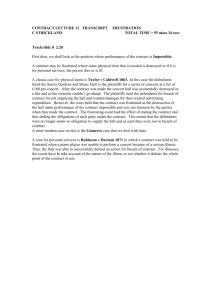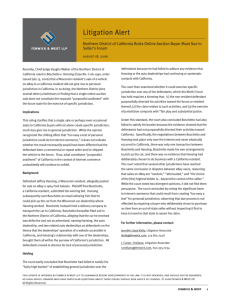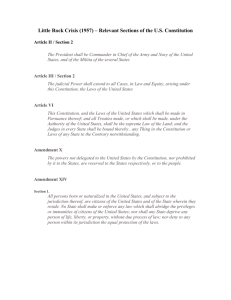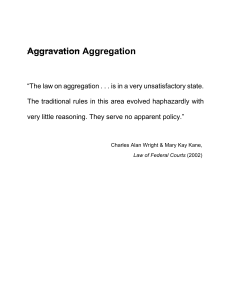58-2011
advertisement
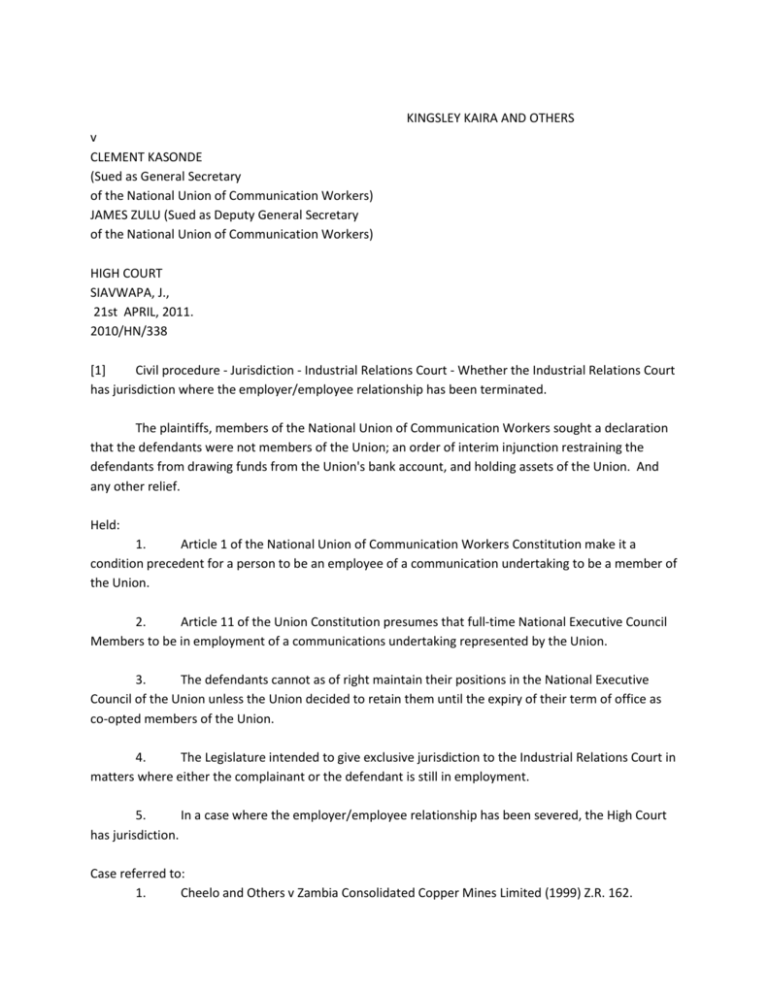
KINGSLEY KAIRA AND OTHERS v CLEMENT KASONDE (Sued as General Secretary of the National Union of Communication Workers) JAMES ZULU (Sued as Deputy General Secretary of the National Union of Communication Workers) HIGH COURT SIAVWAPA, J., 21st APRIL, 2011. 2010/HN/338 [1] Civil procedure - Jurisdiction - Industrial Relations Court - Whether the Industrial Relations Court has jurisdiction where the employer/employee relationship has been terminated. The plaintiffs, members of the National Union of Communication Workers sought a declaration that the defendants were not members of the Union; an order of interim injunction restraining the defendants from drawing funds from the Union's bank account, and holding assets of the Union. And any other relief. Held: 1. Article 1 of the National Union of Communication Workers Constitution make it a condition precedent for a person to be an employee of a communication undertaking to be a member of the Union. 2. Article 11 of the Union Constitution presumes that full-time National Executive Council Members to be in employment of a communications undertaking represented by the Union. 3. The defendants cannot as of right maintain their positions in the National Executive Council of the Union unless the Union decided to retain them until the expiry of their term of office as co-opted members of the Union. 4. The Legislature intended to give exclusive jurisdiction to the Industrial Relations Court in matters where either the complainant or the defendant is still in employment. 5. In a case where the employer/employee relationship has been severed, the High Court has jurisdiction. Case referred to: 1. Cheelo and Others v Zambia Consolidated Copper Mines Limited (1999) Z.R. 162. Legislation referred to: 1. Constitution of Zambia, cap 1, Article 94(1). 2. Industrial and Labour Relations Act, cap. 269 as amended by Act Number 30 of 1997, ss. 20 and 85(1) and (9). Chinene of Messrs Lumangwe Chambers for the plaintiffs. Kasonde of Messrs Patrick Kasonde and Company for the defendants. SIAVWAPA, J.: The plaintiffs are members of the National Union of Communication Workers with PW1 being its Ndola branch chairman. By their claim, the plaintiffs are seeking a declaration that the defendants are not members of the Union, an order of interim injunction restraining the defendants from drawing funds from the Union's bank account, and holding assets of the Union, costs and any other relief. The plaintiffs have erroneously anchored their claim on Article 8 of the Union's Constitution instead of Article 4 (8) in their pleadings. However, in his evidence in chief, PW1 referred the Court to Article 4 (8), the correct provision relating to cessation of Union membership. I allowed the plaintiff to proceed on the understanding that all parties had conceded that an error had been made by the plaintiffs in their pleadings, and the same was deemed amended. Article 4 (8) of the Union's Constitution provides as follows; “Membership shall cease on:(i) Cessation of employment; (ii) Resignation by giving three months notice; (iii)Expulsion of a member; and (iv) Death of a member.” It is not in dispute that the defendants, along with many other ZAMTEL employees, had their services terminated by way of retrenchment following the partial privatization of the company. The two however, continued to hold office as General Secretary, and Deputy General Secretary of the Union respectively. The plaintiffs have argued that on the basis of Article 4 (8) of the Union's Constitution, the defendants' membership of the Union came to an end effectively ending their tenure of Union office as well. The defendants have argued, on the other hand, that termination of employment with ZAMTEL did not affect their holding of Union office as they were full time employees of the Union having been granted leave of absence for four years. They exhibited documents marked “32” and “33” respectively in the Notice to Produce Documents. In his evidence in chief, PW1, the 1st defendant, further argued that Article 4 (8) did not apply to them by virtue of Article 11(1) which provides as follows; “Where any member of the National Executive Council is a full time officer they shall hold office for four years and shall be eligible for re-election. Even (where)they are part time their offices shall be subject to quadrennial congress elections, and shall be eligible for re-election.” It is noted that Articles 13 (2) and 14 (1) of the Constitution designate the offices of General Secretary, and Deputy General Secretary as full time. To that extent, the defendants are full time employees of the Union, until the expiry of the term of four years from the date of their election. The question is whether or not Article 11 is in derogation, or in addition to Article 4 (8). In order to answer this question, I need to consider the overall picture presented in the arguments before me, and the starting point is that the defendants were employees of ZAMTEL, before they were members, and let alone officials of the Union. This is as provided for under Article 2 (1) which states that; “The composition of the Union shall be: - (1) members of the Union who shall be employees of the communication undertaking duly represented by this Union.” This Article makes it a condition precedent for a person to be an employee of a communication undertaking to be a member of the Union and conversely therefore, that one cannot be a member of the Union if they are not employees of a communication undertaking represented by the Union. To that extent, Article 4 (8) is of general application to everyone who is a member of the Union, by virtue of being an employee of a communication undertaking. The defendants, no doubt came within the scope of Article 4 (8) (I ) after their termination, but does Article 11 provide any protection against cessation of membership to full time members of the National Executive Council, which the defendants are? It would appear to me that Article 11 and Article 4 provide for totally difference issues. Whereas the former provides for the period of tenure of office for National Executive Council Members who serve on full time basis, the latter provides for circumstances upon which Union membership may come to an end. I do not see anything in Article 11 that shields full-time members of the National Executive Council from the application of Article 4 (8). If that were the intention, it would have been expressly stated. My understanding of Article 11 is that it presumes full-time National Executive Council members to be in employment of a communications undertaking represented by the Union, and hence only concerns itself with tenure of office and re-election. Article 11 is therefore, not in derogation to Article 4, as the two provide for different circumstances. As rightly noted by both parties, the defendants were seconded to the Union on full-time basis by their former employer, ZAMTEL. The circumstances under which their employment was terminated were not disciplinary, but due to re-organisation of the company, and many other employees were affected. Although salaries and issues of discipline are the responsibility of the receiving organization, the Union Constitution does not provide protection for full-time National Executive Council members against retrenchment. The usual way to go about issues of retrenchment is that the modalities of separation are agreed upon between management and the Union. Considering that the first defendant was the chief executive officer of the Union with the second defendant as his deputy, they should have sought to include a provision in the separation document to exempt the fulltime National Executive Council members from retrenchment until the end of their term as full time Union officials. In his submission, Mr. Kasonde asked the Court to decline jurisdiction over the matter on the ground that the matter was in the exclusive jurisdiction of the Industrial Relations Court, pursuant to Article 94 (1) of the Constitution of Zambia, chapter 1 of the laws of Zambia. He also cited section 20 (1) of the Industrial and Labour Relations Act chapter 269 of the laws of Zambia. Unfortunately, Mr. Kasonde seems to be labouring under the repealed law, as section 20 (1) of the Industrial and Labour Relations Act was repealed, and replaced by Act No. 30 of 1997. The new section 20 states as follows; “Any member or officer of a trade union or any officer of a federation of trade unions, if the trade union is affiliated to it, who has reasonable grounds to believe that a person who is disqualified from holding office has been elected or appointed as an officer of the trade union or that there is a reasonable case against such person for the fraudulent misuse of trade union funds may, not later than thirty days from the date of election or appointment to the office or of becoming aware of the fraudulent misuse of trade union funds, apply to the Court, and the Court may grant such relief or remedy as it may consider just in the circumstances.” It is very clear from the wording of the section that it does not capture the circumstances of the case under consideration, and as such it is of no relevant application. The issue of jurisdiction is however, provided for under section 85 (1) as amended by Act No. 30 of 1997, and it provides as follows; “The Court shall have original and exclusive jurisdiction to hear and determine any industrial relation matters, and any proceedings under this Act.” Subsection 9 defines 'industrial relations matters' as follows; “For the purpose of this section “industrial relations matters” shall include issues relating to (a) Inquiries, awards and decisions in collective disputes (b) Interpretation of the terms of awards, collective agreements, and recognition agreements (c) General inquiries into, and adjudication on any matter affecting the rights, obligations and privileges of employees, employers, and their representative bodies” Even though the list above is only demonstrative, rather than exhaustive, it is clear that the Legislature intended to give exclusive jurisdiction to the Industrial Relations Court in matters where either the Complainant, or the defendant is still in employment. In a case where the employer, employee relationship has been severed, as the case is in this matter, the High Court has jurisdiction. This seems to be the interpretation the Supreme Court gave to section 85 (1) and (9) of the Industrial and Labour relations (Amendment) Act No. 30 of 1997, in the case of Cheelo and Others v Zambia Consolidated Copper Mines Limited (1). I therefore, find that this is a case falling outside the scope of section 85 (1) and (9) of the Act thereby leaving it open to the jurisdiction of the High Court. From the foregoing, I find that the defendants cannot, as of right maintain their positions in the National Executive Council of the Union unless the Union decides to retain them until the expiry of their term of office as co-opted members of the Union, as their membership was extinguished when their services with ZAMTEL, the seconding employer, were terminated. I accordingly declare the defendants not members of the National Union of Communication Workers. I however, make no order for costs due to the unprecedented nature of the case, and issues raised. Complainant's claim allowed.
